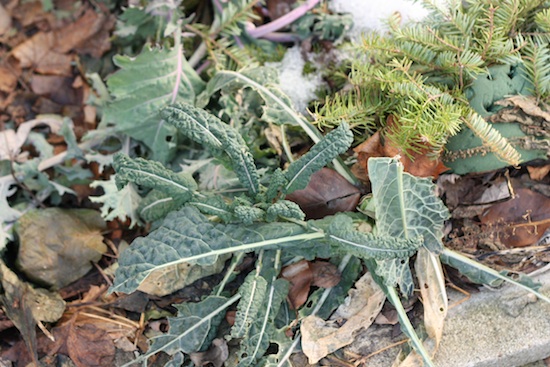The little kale plant had been placed in the edible garden in late fall alongside the large curly-leafed kale bundles and swiss chard bunches that had been growing since early spring. The youngster filled some space where the summer tomatoes had lived alongside the large basil plants that had recently found their destiny in a batch of pesto. Because the little kale could handle the cooler weather (and even quite liked it), his roots grabbed hold and he flourished during the early autumn months.
As Thanksgiving neared, the cold Chicago weather blew in and the older plants were preparing for their eventual move to the compost heap. They knew that they would survive a light frost or two before they bade farewell to the backyard garden. “Hey guys,” piped the little dragon kale one day, “let’s last through the winter this year!” The old plants barely paid attention to such a ridiculous urging.
The first snow came and touched all their leaves with a thin coat of white. After just one day, the sun melted away the cold cover and each of the plants stood tall again. “You see, I think we CAN survive through the winter! Let’s stay here all year,” squealed the little dragon kale who was more encouraged than discouraged by his survival of the first snow.
Again, the naive little plant was ignored. One of the kale elders scolded, “you have no idea what Chicago winter is like. There will be many feet of snow that will cover you for weeks so that you cannot see the sun. The ground will freeze. You cannot eat or drink. It is not our destiny. You will not survive the winter.”
“Harumph” thought the little kale. “I-think-I-can.”
One day, the woman approached the garden wearing her beat up, old, leather gloves. She took a last look at the plot and then pulled each of the failing plants and tossed them on the compost heap.
Though the little dragon kale was surprised, he was not entirely hopeless. “I -think-I-can, I-think-I-can,” he chanted day and night. Snow came just as the older kale plants had warned. It covered him for days at a time but then melted away. He used the melted snow to drink and reached his roots for the soil.
By the end of February, the gardener noticed the little kale plant on top of the compost pile and she saw that his leaves were still green and strong and full of life. She began to encourage the little guy and on the way to and from the garage, she would sometimes stop by and whisper to him, “I think you can too.”
The little dragon kale knew that if he could last just another month, she might take him back to the garden and put him in his old spot. He could flourish again under the warmer spring sun and she would pluck his leaves for her white bean and sausage soup.”
*to be continued*

